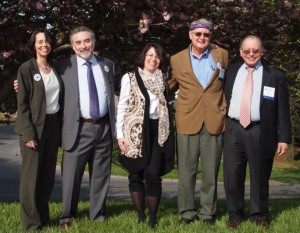What if you had a condition no one could name? You try all kinds of medications and treatments, but none of them work. You’re in and out of hospitals and emergency rooms after suicide attempts. Some doctors think you’re a fraud. In a years-long struggle to stay hopeful, you’re lucky if you can stay alive.
That is what it’s like for people with dissociative disorders.
Now, Towson University psychology professor Bethany Brand is leading the world’s largest and longest international study on the effective treatment of those disorders, broadly referred to as DD.
Dissociation starts out as a kind of life preserver. In cases of chronic childhood trauma—any kind of prolonged abuse, usually at the hands of someone a child knows or loves—the brain shuts off parts of its reactionary processes. It lets a child “turn off” his or her physical and emotional environment- and memory-based responses to functionally survive the ordeal. But if a child is badly scarred psychologically, dissociation can become permanent, leading to a set of disorders that doctors and even researchers barely understand.
Dissociative Identity Disorder is one subcategory, formerly known as Multiple Personality Disorder. It formed the basis of an Emmy-winning dramatic comedy on Showtime called The United States of Tara. But Brand says some of it was misrepresented.
“Very few professionals receive any training in how to detect or treat DDs,” says Brand. “In general, childhood trauma research is not well-funded.” And studies are typically funded for 13 weeks or fewer. Effectively treating DD takes years.
According to Brand, about one percent of the world’s population suffers from the most severe type of DD. Schizophrenia, which is not a DD, affects the same percentage, but a Google search for scholarly articles on schizophrenia turned up 103,000 results. When Brand looked for research articles on DD treatment, she found eight.
Fortunately, her team has doubled that.
For the first phase of the study, called Treatment of Patients with Dissociative Disorders (TOP DD), Brand and her team refuted claims that DD does not respond to treatment. They evaluated treatment response in 280 patients around the world. At the end of the study, patients had fewer symptoms of DD and fewer hospitalizations.
In April, Brand presented the results at a traumatic stress conference at Sheppard Pratt, with support from the International Society for the Study of Trauma and Dissociation. The attendance alone demonstrated the need for her team’s work: in a region rich with opportunities for mental health research and practice, the conference sold out. Funding for the study came through grants from Towson University, two private family foundations, and donations from therapists and patients. The attendees at the conference donated $25,000 for the next study: developing a website that will engage DD patients and their therapists around the world in an effort to improve treatments and outcomes.
It won’t be easy. Among other elements, Brand and her team will produce a series of five-minute videos providing exercises for patients—things like actively engaging in an emotion for a set period of time or writing a list of alternatives to self-harm behavior. But to maximize understanding, everything on the site has to be done at a 6th-grade English level. And any patient who uses it must be in individual therapy, in case something on the page—a color, a voice, a hairstyle—triggers a dissociative behavior.
Along with the $25,000 raised at Sheppard Pratt’s conference, funding for this next study will come from Towson’s College of Liberal Arts, as well as private donations. It will also involve technical support from new media professor Thom Lieb, as well as an Irish web company that specializes in psychiatric content. The site will contain embedded analytics to track its usage and effectiveness.
Brand is still working to raise more funding, but she says the work is worth it. The benefit ripples from the patient to society as a whole. “If we are able to provide treatment that is effective and tailored to their symptoms, we may be able to provide a substantial reduction in health care costs,” she points out. “Many of these patients are so ill they cannot work, so they receive psychiatric disability payments and live in government subsidized housing.
“If they receive appropriate treatment, some of these patients could eventually become sufficiently functional that they could gradually return to employment.”
And that gives everyone hope.
Click here to donate to the TOP DD study. In the middle of the page, where it says “I would like to support…” select TOP DD from the dropdown menu.
TOP DD Research Team: Bethany Brand, Ph.D. (Towson University); Frank Putnam, M.D. (Cincinnati Children’s Hospital Medical Center and University of North Carolina); Ruth Lanius, M.D., Ph.D. (University of Western Ontario); Richard Loewenstein, M.D. (Sheppard Pratt Health System and University of Maryland); Gregory Chasson, Ph.D. (Towson University); Thom Lieb, Ph.D. (Towson University); Catherine Classen, Ph.D. (University of Toronto); Claire Pain, M.D. (University of Toronto); Amy Myrick, L.C.P.C. (Family & Children’s Services of Central Maryland); Paul Frewen, Ph.D. (University of Western Ontario); Suzette Boon, Ph.D. (Netherlands); Onno van der Hart, M.D. (Netherlands); and Kathy Steele, MN, CS. (Atlanta, GA).


